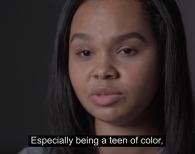Starbucks commissioned award-winning PBS filmmaker Stanley Nelson to make a film to show as part of their bias training. Watch the film.
implicit bias

When you hear the words identity safety, you might immediately think it has something to do with “identity theft.” Identity theft refers to when someone steals your name and financial identity, so you can no longer use your credit cards or fully function as yourself. How would it affect you psychologically to have your identity stolen? Uncertain, defensive, afraid to trust?

This blog is the second in a three-part series that links three important ideas—implicit bias, stereotype threat and identity safety—all backed by research. Republished with permission from Teaching Tolerance.
By Becki Cohn-Vargas
Not In Our School Director
Most teachers want to be fair to each student. How many times have you heard educators say, “I treat everyone the same”? But is this even possible—or desirable? When we ignore differences, even in the absence of overt negative stereotypes, implicit bias is still at play—and there is another detrimental force that can flourish under the surface: stereotype threat.

As educators, it may seem overwhelming that, in addition to addressing overt racism in our classrooms and schools, we also need to tackle unconscious racial prejudices, known as “implicit bias,” not only in our students, but in ourselves. However, it is possible to address implicit bias, and the solutions are in our hands.
